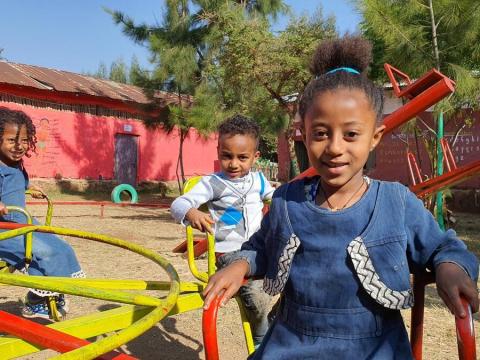Building Strong Foundations: The Importance of Early Childhood Development in a Changing World

By Viktorya Sargsyan, Senior Advisor for Early Childhood Development and Education
As we celebrate International Education Day 2025 with the theme “AI and Education: Preserving Human Agency in a World of Automation,” it’s important to think about education that starts from birth. Early Childhood Development (ECD) is a crucial time when we can lay a strong foundation for a child's success in school and in life. In a world where technology and AI is everywhere, it’s vital that we give children the support they need during these formative years.
ECD helps children develop the skills, knowledge, and emotional resilience needed to succeed both academically and socially. The LANCET 2024 ECD series reports that kids who get early learning support and responsive care are about two years ahead in development compared to those who do not. Currently, only 1 in 3 children aged 3-4 are receiving the necessary developmental stimulation, and only 38.8% have access to Early Childhood Care and Education (ECCE). The LANCET series also emphasises investment in early years can have significant benefits, estimating returns of 8–19 times the initial investment in ECCE. These investments are essential for maximising children's potential and achieving the Sustainable Development Goals (SDGs).
AI can create opportunities but also challenges for ECD. The potential benefits could be enhancing ECD via AI-powered tools to support language acquisition, creativity through interactive games and stories, or simulate social interactions in safe environments (UNICEF blog on AI and ECD). AI can also help address equity issues by accommodating diverse learning needs and providing customised learning for children with disabilities. It can assist parents/caregivers by offering tailored resources and suggestions to support children's development at home.
While AI holds great promise, its integration into ECD also presents challenges. For example, unequal access to technology could exacerbate existing inequalities, widening the learning gap rather than closing it. Over-reliance on AI could diminish essential human interaction and the development of social-emotional skills, and may limit opportunities for children to develop social skills and emotional intelligence through human interaction and play.
World Vision (WV) is committed to a comprehensive approach to education that starts from birth to adolescents, especially for vulnerable children in hard-to-reach areas. WV prioritises the needs of children living in fragile, emergency, and remote areas, as well as refugees and displaced families. Responsive caregiving is a key part of this approach, helping to build a solid foundation for resilience and development. The World Vision programmes provide caregivers with the necessary tools and knowledge to create nurturing environments, highlighting the important role families play in their children's success.
World Vision primarily uses community-based solutions, offering learning sessions for parents and caregivers that focus on daily interactions, storytelling, and play, as essential elements of early learning. By encouraging exploration and curiosity, families help prepare their children for school.
Technology and artificial intelligence also play a vital role in enhancing education and ECD outcomes, especially in vulnerable communities. Here are some ways World Vision utilises these platforms:
- Capacity building: Digital platforms help train staff and partners in core methods and project models.
- Parent support Tools: Mobile apps such as UNICEF BEBBO, offering caregivers resources, video tutorials, and activity ideas to promote responsive parenting.
- Remote training and workshops: Many field offices held virtual workshops during and after COVID, allowing caregivers to learn from experts regardless of their location.
- Data-driven insights: The Measuring Evidence of Quality Achieved (MEQA) platform tracks education/ECD programme progress over time. For example MEQA measures caregiver practices and the quality of ECD centre services. It helps provide support to caregivers and educators by giving insights into areas that need attention, thus improving learning outcomes.
This International Education Day, let’s commit to building strong foundations for lifelong learning. Investing in ECD is more than just an educational effort; it creates a pathway for success throughout primary, secondary, and lifelong education while helping address systemic inequalities. By implementing strong programmes and using technology, we can ensure every child has the chance to learn and thrive.
To learn more about our Early Childhood Development work we suggest you read: